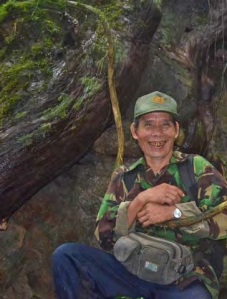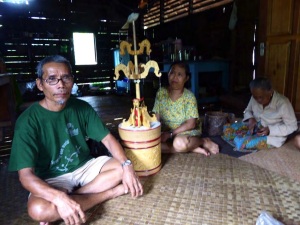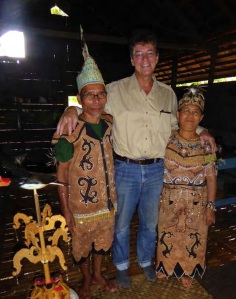Apui is a real Dayak of the tribe of the Seberuang. He does not know exactly how old he is since most Dayaks do not celebrate birthdays. They do celebrate the fest of the harvest, which they call DzGawaidz and have many other ceremonies connected to the natural cycle of life such as when they get married or when someone dies. Birthdays seem to have little to do with that. Life mostly goes on from day to day, from year to year. I saw Apui and his big smile for the first time many years ago when I visited Tembak, the small village deep in the jungle of Borneo. It was in an improvised bamboo structure to receive guests visiting the village and he did the coconut dance, making everyone laugh. He also supervised the drinking of the rice wine from a big porcelain vessel where two people had to drink from straws made of Papaya leaf stalks while he kept adding wine. No spilling allowed! The laughter increased with every round.
At that time, at least five years ago, Apui did not yet have grey hair, now most of his hair is silver colored. But there are no changes in his physique or smile and he still wears the same hat with the Hornbill feather and the same glasses. And his teeth are still complete, thanks to the daily chewing of Bethel nut that he stamps to a fine pulp in a small bamboo and then folds a pepper leaf with a bit of chalk smeared on it around the pulp and starts to chew it. This makes his teeth very strong and also very red. Many older Dayaks, including Apui’s mother who lives with him, chew the Bethel nuts that they call DzPinangdz. I once tried a piece that he offered me but did not find it very palatable neither for me having the effect that they describe to it. It is supposed to clear your mind so you can better understand life, and it relaxes you. In many other places around the world people plant this slender palm, but a special stronger variety, and chew its nuts.

Apui must be some 65 years old when I estimate this age based upon the ages of his five children. Agung, his youngest son, got married only recently at the age of 23͵ and his mother is the third oldest person in the village. Apui is a real Dayak that knows and loves the forest. I remember one day some two years ago while we roamed the nearby Saran jungle and he asked me to record a message. We were at the foot of a special rock covered with roots from a giant fig tree seen here at the left. There he sat down, prepared his Bethel nut and then in simple words sent his message to the world, which I recorded with my photo camera. To outsiders it may not look like or sound like anything special, but I saw the tears in his eyes and it was Apui speaking from his heart. “The forest is our home. I love the forest. It makes that we can live. We must preserve our forest.”
Apui still masters the skills to live in the jungle, the knowledge of his orefathers that during thousands of years presence in Borneo accumulated the experiences and insights that allowed them to survive. Apui has no identity papers, but he knows the names of a thousand family members in the tribe and they know him. He is connected to the forest and his relatives, not to a piece of paper of some far away entity that decided he is Indonesian. He has no formal education, but he is one of the smartest persons in the village. He maintains a medicinal plant collection behind his house and knows many special old recipes to cure people from a wide range of diseases. He knows how to find the resin of the mites that sometimes infect twigs of a special kind of tree. The resin is very sticky but when warmed it is the strongest glue imaginable and the blades of the machetes and Dayak swords he makes himself, for he is also a smith, never come loose from the wooden handle, despite years of intensive use. He also was the initiator and builder of the mini hydro that provides the village with electricity. The water wheel and all the different valves were made from local wood carved by Apui.
In his young years Apui made the biggest fields to grow rice. He built his own house and he makes sure the rice harvest fest takes place. He keeps the traditions of his forefathers. He also was a hunter. Often he would go out for two or three days to hunt for pig or deer. And he recounted me once how in 1993͵ he had shot an orangutan in the Saran forest. But when he had hit her she cried and was laying there on that branch looking at him while bleeding to death. Apui still tears up when he recounts that event. Since that day he has never hunted again.
When Apui walks through the jungle there is no sound of his bare feet steps. And he constantly looks up to the trees and the plants around him. Every step he makes effortlessly he is observing and studying and in an almost meditative state. We don’t say much when we walk. For one, because I need all my focus on avoiding thorny branches and slippery rocks, while Apui floats through the forest undergrowth plucking leaves, picking up fruits and sometimes suddenly stopping to listen to a far away sound. Apui is constantly connected to his forest, the forest he loves. And when we stop because I, or someone else in the group is tired, he sits down to get the little bamboo from his small woven backpack and prepares his Bethel nut. Then I can catch up and ask him about everything he noticed and observed and collected. I did lots of formal studies on tropical forests and worked here in the field in Indonesia for some ͵35 years, but every walk with Apui brings me knowhow about things that have not yet been recorded in scientific books. Apui is a walking encyclopedia. Fortunately I can share with him some knowhow on uses of his forest plants and mushrooms in other parts of Indonesia, so our walks are mutually enriching.
But it is not about the knowhow I need from Apui. Most of all he is my friend. We make an odd couple, the maybe 50 kilogram Dayak and the double sized tall European. But there is much we do share! Our love of the forest and the science in it, but even more so, our feelings about righteousness, honesty and our fears for where the world is heading. We hug, we can laugh and cry together. We speak openly about our worries and hopes. We are real friends for life. We are family.
Willie Smits, September 1st, 2014

Here Apui, his wife and mother are sitting in the kitchen of their house in the Tembak village. The special ritual box Apui made himself. His wife makes the best rice wine in the village and his mother, who made the mat they are sitting on, is preparing the Bethel nut. She still likes to make jokes and loves to dance!
 To the left a picture of Apui and his wife in the special ceremony clothes that Apui’s wife made herself from the bark of a local tree. Pak Apui wears the hat he always wears, but he has also one with the feather of an Argus pheasant. Their kitchen hut on stilts is cool and well ventilated, made only of natural materials.
To the left a picture of Apui and his wife in the special ceremony clothes that Apui’s wife made herself from the bark of a local tree. Pak Apui wears the hat he always wears, but he has also one with the feather of an Argus pheasant. Their kitchen hut on stilts is cool and well ventilated, made only of natural materials.
Leave a Reply